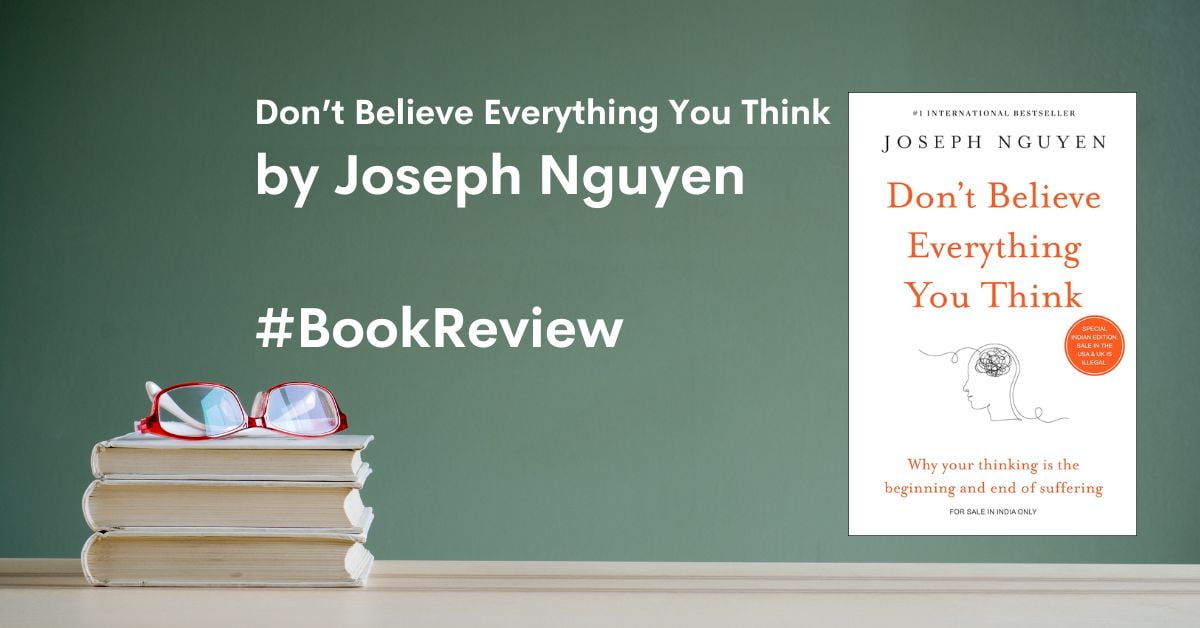Don’t Believe Everything You Think by Joseph Nguyen Book Review
“Don’t Believe Everything You Think” by Joseph Nguyen is a thought-provoking book that aims to guide readers toward a more mindful and fulfilling life. The book centres on the concept that many thoughts are not grounded in reality and can often lead us astray. Nguyen advocates questioning and reevaluating our thought patterns to cultivate a more positive and accurate self-perception. Well, let’s come face to face with reality now.
Joseph Nguyen presents his book as a guide to liberating oneself from unexamined thoughts and beliefs. However, the book’s foundation is not firmly rooted in scientific reality, relying instead on the author’s propositions and anecdotal evidence. Nguyen asks readers to take his conclusions at face value, constructed more on introspective reflections than empirical research. Consequently, the book often lacks coherent arguments and substantive backing, making it a less convincing resource for those seeking well-grounded, scientifically supported insights into mindfulness and self-improvement.

In this book review article, I will examine the book’s strengths and weaknesses. I will also share a list of other books in the same genre that you can enjoy after you read the present book (or decide to skip it after a few pages). Let’s begin with the first thing you read when you open the book, the introduction. It starts with these lines:
“This book was written to help you find everything you’ve been searching for and the answers to all the questions you’ve had your entire life. I understand this is a very bold statement, but you will shortly see why I have complete confidence in saying this.”
No, Joseph! No book can help you find ‘everything’ you have been looking for. And this is not your ‘confidence’ speaking. This is your foolishness or arrogance, or you don’t know anything about wants and fulfilment!
I was curious and confused after encountering such blatant conclusive lines on the opening pages. Was this the last book I may have read? Going on, I came across this relatable analogy:
“if we let the bowl of dirty water sit for a period of time, we can see that the dirt begins to settle on its own in the water and after a while, the water becomes clear on its own.”
However, the author should realise one thing. If a casual air blow stirs the water in the bowl, the dirt will mingle again with the water. And once again, we may have to wait! Joseph goes on to compare this scenario with our thoughts and thinking process. If we let our mind relax, sit still and ‘think nothing,’ things might come to clarity. I partially agree—however, all these sound good in an abstract model of the cat in the box.
The book follows a simple template (somewhat cliche)–quote by some ancient or recent popular personality, and then you explain what’s in your mind.
Let’s come to the strengths and weaknesses of this book.
Strengths
- Accessibility: One of the primary strengths of Nguyen’s book is its accessibility. The language is straightforward, and the concepts are presented in a way that is easy for readers from various backgrounds to understand. This makes the book an excellent entry point for those new to self-improvement and mindfulness.
- Practical Advice: Nguyen offers practical advice that readers can readily apply daily. His suggestions for mindfulness practices and cognitive restructuring are simple yet effective tools for personal growth.
- Engaging Writing Style: Nguyen’s writing style is engaging and relatable. He uses anecdotes and personal experiences to illustrate his points, making the book more engaging and accessible to connect with on an individual level.
Weaknesses
- Simplicity: While the book’s simplicity is a strength in terms of accessibility, it can also be seen as a drawback. The concepts Nguyen discusses are often presented at a surface level, without the depth and nuance expected from a more comprehensive treatment of the subject. The book may come across as overly simplistic for readers already familiar with basic self-improvement principles.
- Lack of Scientific Rigor: One significant criticism of “Don’t Believe Everything You Think” is its lack of scientific backing. Nguyen does not provide substantial empirical evidence or reference scientific studies to support his claims. This can be a notable drawback for readers who prefer well-researched and evidence-based arguments in self-help literature.
- Self-Referential Logic: Nguyen often relies on self-referential logic, putting his personal beliefs and ideas against opposing viewpoints without adequately addressing counterarguments or providing substantial justification. This approach can weaken the credibility of his arguments and make the book less persuasive for critical readers.
Recommendations for Further Reading
For readers interested in well-researched and scientifically backed self-help and mindfulness literature, the following books are highly recommended:
- “Thinking, Fast and Slow” by Daniel Kahneman: This book provides a comprehensive look at the dual systems of thinking that drive our decisions. Kahneman, a Nobel laureate in economics, draws on decades of research to explain the cognitive biases and heuristics that influence our thoughts and actions.
- “The Power of Habit: Why We Do What We Do in Life and Business” by Charles Duhigg: Duhigg’s book delves into the science of habits, drawing on extensive research to explain how habits form and how they can be changed. The book provides practical strategies for developing positive habits and breaking negative ones.
- “Mindset: The New Psychology of Success” by Carol S. Dweck: Dweck, a renowned psychologist, presents her research on fixed and growth mindsets. She explores how our beliefs about our abilities can impact our success and provides actionable advice for fostering a growth mindset.
- “The Happiness Hypothesis: Finding Modern Truth in Ancient Wisdom” by Jonathan Haidt: Haidt, a social psychologist, combines ancient philosophical wisdom with modern scientific research to explore the roots of happiness and well-being. The book offers a balanced and nuanced perspective on the factors contributing to a fulfilling life.
- “Grit: The Power of Passion and Perseverance” by Angela Duckworth: Duckworth’s research on grit—the combination of passion and perseverance—offers valuable insights into the role of effort and resilience in achieving long-term goals. The book is grounded in empirical research and provides practical advice for developing grit.
Conclusion
“Don’t Believe Everything You Think” by Joseph Nguyen is an accessible and engaging introduction to mindfulness and self-improvement. However, its simplicity and lack of scientific rigour may leave some readers wanting more. The recommended books provide well-researched and compelling alternatives for those seeking a deeper and more evidence-based exploration of these topics.
Review by Adarsh for Desi Readers
Don't Believe Everything You Think by Joseph Nguyen Book Review
- Critical Rating
Summary
A repackaged box of ancient wisdom with contemporary logic that seldom connects with conscious (or even subconscious minds). It’s up to you, readers!
